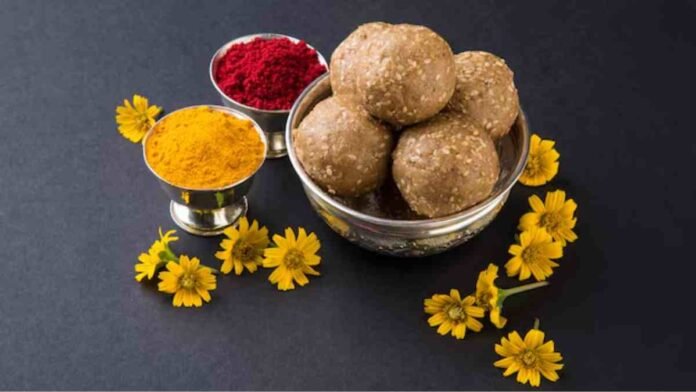Makar Sankranti is one of Maharashtra’s most cherished festivals, marking the transition of the sun into Capricorn. It’s a time for happy celebrations and family get-togethers. Necessary customs include the haldi kumkum rite, which represents harmony and kindness, and the sharing of tilgul, a confection made of sesame and jaggery.
Significance of Tilgul
During Makar Sankranti, tilgul, a traditional confection made from sesame seeds and jaggery, has significant cultural and nutritional value. It is ideal for the winter months because of the warmth and vitality that the sesame and jaggery combine to produce. In terms of nutrition, jaggery helps with digestion and strengthens immunity, while sesame is high in calcium, iron, and antioxidants.
The phrase “Tilgul ghya, god god bola” (Take tilgul, speak sweetly) reflects its deeper meaning—encouraging people to speak kindly and foster positivity. Offering tilgul to friends and family during Makar Sankranti symbolizes unity, strengthens relationships, and promotes goodwill and harmony within the community.
Importance of Haldi Kumkum Ritual
The Haldi Kumkum ritual is a beloved tradition in Maharashtra, where ladies gather to exchange haldi (turmeric) and kumkum (vermilion), blessing one another. This ritual promotes camaraderie and unity by symbolizing the warmth and power of relationships.
During Makar Sankranti, a festival that marks the harvest season, this ritual holds special significance as it is a time to honor women in the community. By expressing the spirit of the season and the delight of group bonding, the blessing exchange not only strengthens personal ties but also acts as a show of appreciation, wealth, and kindness.
The Cultural and Social Impact
Social cohesion and a sense of community are greatly enhanced by the customs of sharing tilgul and conducting the haldi kumkum rite. By encouraging people to gather and celebrate, particularly women and families, they foster happiness and peace. These traditions improve links within the community and open doors for cross-cultural interaction. The qualities of kindness, unity, and togetherness are reflected in both tilgul and haldi kumkum, underscoring the importance of unity in Maharashtra culture
Makar Sankranti celebrations are made more significant by the customs of sharing tilgul and taking part in the haldi kumkum rite, which exquisitely represents sweetness, goodwill, and oneness. I hope you have a happy and prosperous Makar Sankranti in 2025!



